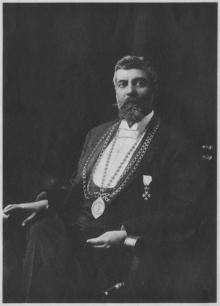Establishment and Institutional Framework
The Folklore Archive was established in 1918 (Law 1304, Greek Government Gazette A΄, n. 85/18-04-1918). It was Nicolaos Politis who inspired and founded it. He was Professor of Greek Archaeology and Mythology at the University of Athens and “father” of the discipline of Folklore in Greece. Stilpon Kyriakidis was the first Director of the Archive.
In 1926, when the Academy of Athens was established, the Folklore Archive together with the Commission for the Historical Dictionary of the Greek Language, and with the National Music Collection, founded in 1914, and some other scholarly commissions, were placed under its aegis. [Law 4398/29, Greek Government Gazette 308, n. A΄, 18-03-1926].
In 1944 the Senate of the Academy of Athens approved of the first Regulations for the Operation of the Folklore Archive, compiled by Georgios Megas, who was Director of the Archive since 1936.
In 1966, while Georgios Spyridakis was Director, the Folklore Archive was renamed the Hellenic Folklore Research Centre (Law 4545/1966). In 1967, the Senate of the Academy of Athens approved of a new set of Operation Regulations.
In accordance with the Law on Research (Law 1894/1990), the personnel of the Centre, formally referred to as compilers, were renamed Research Staff and assigned positions on the basis of committee review. Since 1996, thanks to the assistance afforded by European Community programmes, the Centre has been modernising its operation and digitalising its rich archival material.
The Hellenic Folklore Research Centre is a repository of folk culture and expresses the national consciousness and cultural identity of Hellenism. Besides promoting and facilitating research, it functions as a platform for the debate of theoretical and methodological issues, thereby reflecting manifold social reality and, in particular, the academic identity of Greek folklore studies.
The archive of the Hellenic Folklore Research Centre contains a rich collection of holdings, which have been collected and added to since the late 19th century. It contains a great deal of folklore material in written form, both published and unpublished. It also holds musical recordings, photographs and film and video material that pertain to every aspect of folk culture regarding the material and spiritual life of the Greek people.
Today the Hellenic Folklore Research Centre is better placed than ever to promote its permanent, fundamental aims and to respond to contemporary needs that arise as a result of changes in academic thinking over time. Such changes include contemporary academic trends that favour rapprochement and communication among the academic disciplines of folklore, ethnology and social anthropology. Thanks to assistance afforded by various European Union programmes and national funding, the Centre is also better placed than ever to preserve and digitise its collection of valuable material. Its physically surroundings have also been considerably upgraded, as it is now housed, in 2002 in an elegant Neoclassical building in the centre of Athens, the gift of the Foundation Lilian Voudouri.
Page Style
Current Style: Standard
